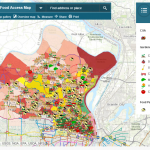In ecology, keystone species are the animals and plants that uniquely contribute to their environment in such a way that the ecosystem they live in would be totally unrecognizable without them. For example, prairie dogs work the soil when they make their homes, which helps nutrient-rich grass grow – this grass feeds the other animals in their ecosystem.
Keystone species exist in human communities too – these are the people who have outsized influence within their networks of friends, family, neighbors, coworkers, and associates. These people are not necessarily rich or powerful – but they do tend to be committed to the betterment of their neighborhoods and cities, they tend to be outspoken, and they tend to know a LOT about their environment.
Without keystone species in communities, the Green Dining Alliance would have a difficult time helping restaurants to lower their environmental impact. That’s because keystone species help make things happen by connecting us with restaurant owners and managers, setting up meetings, and stressing the importance of recycling and other good environmental practices for businesses to everyone they know.
The GDA has met a lot of keystone species over the years, but two stand out as particularly motivated, helpful, and influential – that’s The Loop’s Director of Marketing, Jessica Bueler, and University City Project Manager, Jenny Wendt.
Bueler initially helped the GDA get a slot at The Loop’s business district meetings, where we were able to talk about the benefits of the program to a large group of business owners, including Joe Edwards, who owns multiple restaurants on the strip – all of which are now GDA certified. Bueler liked what she heard, and made time in her busy schedule to make turning The Loop into a Green Dining District a priority for her.
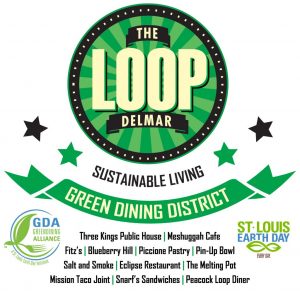
Bueler immediately understood the marketing value of sustainability, as well as the altruistic value of improving a neighborhood that she loves passionately. She attended Green Team meetings, which were headed by Wendt, to try to understand as much as she could about sustainability. Bueler took what she learned at the meetings to heart. After learning about opportunities for environmental improvement, she and Wendt signed dozens of restaurants up for a commercial recycling service offered by University City. (Bueler is known to exclaim things like, “why aren’t we already doing this?!,” or “what a great idea!!,” at Green Team meetings, which were always held at potential GDA restaurants).
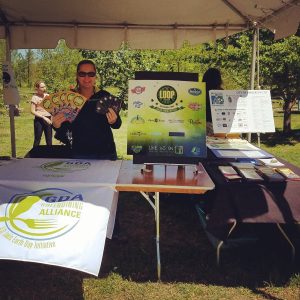
Bueler tabling with the Green Dining Alliance at the St. Louis Earth Day Festival.
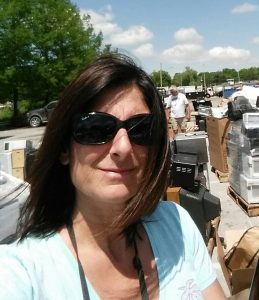
Jenny Wendt at one of her recycling events in University City.
Once restaurants began recycling, Bueler helped the GDA discuss the benefits of GDA Certification with individual restaurants – this was essential, as joining the GDA takes work from restaurant owners, busy people who have a lot on their plate. Bueler made it easy on both the restaurants and the GDA, thanks to her close connections with each business and her intimate knowledge of the area. She understood intuitively which restaurants would be interested in joining, and even in what order they should be approached to achieve a successful result. When 25% of the independent restaurants in The Loop earned GDA Certification, Bueler helped to organize a Green Dining District announcement party in The Peacock Loop Diner – a LEED certified diner whose space was generously donated by Edwards.
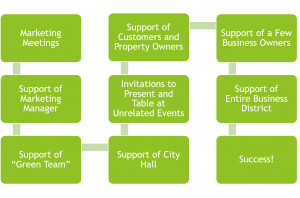
Timeline of how The Loop became a Green Dining District
Bueler added a page about the GDA to The Loop’s website (Bueler and her husband Ryan Griffore have made a dozen graphics for the GDA to use for promotions) and helps to promote The Loop’s GDA Certified restaurants through the Delmar Loop Green Dining District Facebook page. Bueler and Wendt take every opportunity to promote the good work The Loop does to improve its sustainable efforts. Bueler and Wendt both tabled with the Green Dining Alliance at the St. Louis Earth Day Festival in 2017, bragging to the 60,000+ attendees about the good work The Loop and University City has done to reduce their environmental impact. Bragging rights include their Green Dining District, pervious pavement in their parking lots, side-by-side recycling bins on the Delmar strip, LED lights, and terracycling containers for cigarette butts. The Loop continues to improve its sustainability efforts- they are now working to get Green Business District Certification from the Green Business Challenge, thanks to Bueler’s interest in starting the program. Bueler even worked to secure an Earth Day Action Grant to use leftover food from The Loop restaurants to feed hungry people.

One of the many graphics Bueler and her husband, Ryan Griffore, have created for the Green Dining Alliance.
Bueler and Wendt are definitely keystone species in their communities. Chances are, if you’re reading this, you’re a keystone member of your community too. You have the power to use your outsized influence to help improve your neighborhood! Get involved, and never stop learning about ways to make St. Louis greener!
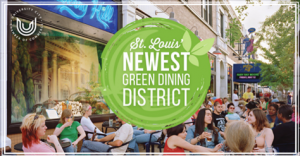
Copyright St. Louis Earth Day 2017 – All rights reserved.



